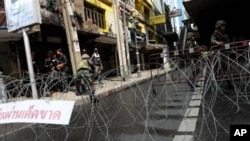Cambodians in Phnom Penh on Monday said they were watching the unrest and increasing violence in Bangkok, but sympathy between the authorities and anti-government protesters was split.
Violence escalated in Bangkok over the weekend, where at least 36 people have died since Thursday in the worst violence to hit the capital in decades. “Red shirt” protesters have seized a key part of the capital, and Thai security forces have begun to move in on their blockade, with the government calling for protesters to leave their entrenchment.
But who was to blame for the violence was debated in Cambodia, with many supporting the government in what they see as an illegal demonstration.
“I support the crackdown by the government on the red shirts, to avoid the negative effects on the economy, security, order and harmony of Thai society,” Ly Sokheng, a 24-year-old student at the Royal Phnom Penh University, said Monday. “The crackdown was right. The Bangkok government informed the red shirts about the crackdown if they didn’t disperse. On the other hand, the red shirts were armed against the authorities [which is] an illegal act.”
Cambodia is no stranger to street violence. Phnom Penh saw fighting in 1997, when the Cambodian People’s Party seized power from Funcinpec in a violent coup. Lessons from years of war were more apparent in older Cambodians Monday.
“The use of guns to kill the red shirts by the government is not a right or democratic act,” said Chim Rotha, a 43-year-old street sweeper, who was working near the Ministry of Foreign Affairs Monday. However, he said the red shirts bore some responsibility for using weapons against the authorities.
“The authorities and the red shirts must not use weapons to solve the problem,” he said. “They should use peaceful negotiations. The red shirts’ use of weapons is illegal, but the government’s shooting of red shirts violates human rights.”
Others called for calm amid the violence.
“The red shirts should accept the road map composed by the prime minister…to hold a new election in November in exchange for the dispersal of the anti-government rally,” Ngoeum Phally, a 21-year-old student at Phnom Penh University, said. Both sides should sit and talk to resolve their differences, she said. “But right now the government’s use of force to kill the red shirts is shameful.”
Chhet Takk, 25, a student at the Kampuchea Mekong University, blamed both sides for the violence. “The government and the red shirts must now be responsible for the dead,” he said.
Meanwhile, the Ministry of Foreign Affairs issued its own statement Monday, saying the “severe violence” was “gravely” affecting the image of Thailand and 10 Asean members. The statement called on all parties to resume peaceful talks and “restore peace and normalcy to the Thai people, thus stability to the region.”




